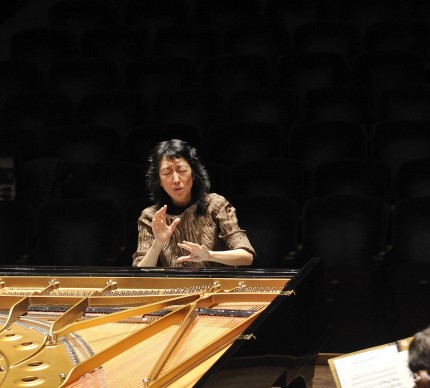Uchida’s Mozart extraordinary once again with Chicago Symphony Orchestra

Photo: Roger Mastroianni
There are some marriages of artist and repertoire that seem so natural and perfect that even the most persnickety of critics can only sit back, put one’s pen away and wonder at the results.
Such was the case again Thursday night at Symphony Center when Mitsuko Uchida returned for another double-duty evening of Mozart, playing and conducting two of his piano concertos.
This year’s installment of Uchida’s Mozart series coupled one of the composer’s most popular essays in the genre with a relative rarity, a Mozart divertimento serving as the central palate cleanser.
The Piano Concerto No. 11 in F major, K.413, was only one of six in the genre published during Mozart’s lifetime, a testament to its popularity. To modern ears it seems a bit old-fashioned—cast in a galant style with the shade of Johann Christian Bach hovering nearby, the work even closes with a graceful minuet rather than a lively Rondo. Yet even here, Mozart sometimes upends the surface galanteries with sudden jabbing chords and abrupt shifts into the minor.
Uchida’s Mozart is a known commodity in Chicago now, but that doesn’t make it any less wondrous or remarkable. Both in her conducting and solo playing, Uchida’s performances have an ideal balancing of refinement, rhythmic vigor and precision with seamless chamber-like ensemble between her and the orchestra. Consistently she brings out the dynamism, as with the firmly pointed march motif in the opening movement. Yet there is a natural simplicity and intimacy to her Mozart that seems just right—as with her poised expression in the arietta-like Larghetto, tender and reflective but never sentimental, and the gracious account of the closing movement, kept properly in Rococo scale.
That natural sympathy for Mozart’s music was just as palpable in the more familiar Piano Concerto No. 21, in C major, K.467. Even by Mozart’s standard, the thematic richness of the opening movement is astounding, and Uchida and her CSO colleagues’ sparkling partnership brought out the verve and ingenuity of the writing.
The celebrated Andante with its long, high-lying solo was rendered with an elegant expressive purity by Uchida and the ensemble. The buffa-like closer with its rapid-fire alternation between piano and orchestra was exhilarating, Uchida and the winds batting material back and forth in one of Mozart’s smost delightful inspirations.
Uchida’s concerto series with the CSO has given local audiences some sterling Mozart and the CSO should seriously consider putting out a set of these perfromances on its Resound label. I’d buy it.
The evening’s centerpiece, Mozart’s Divertimento in B flat major, K. 137, was a CSO premiere. Concertmaster Robert Chen and string colleagues elected to present Mozart’s brief work Euro-style—entering the stage together and standing for the performance.
As with Uchida’s Mozart, the performance was idiomatic and unerringly stylish, with Chen leading the ensemble in playing of quicksilver energy and firmly pointed accents.
The program will be repeated 8 p.m. Friday and Saturday and 7:30 p.m. Tuesday. cso.org; 312-294-3000.